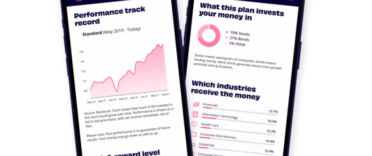 An annuity pension is a financial product that secures you a regular income in your retirement. If you have spent your working life paying into a defined contribution pension, you can use the money accumulated in your pot to ensure you have a consistent income for the rest of your life, or for a set period of time. Many pensioners will find it reassuring to know how much they will get every year, rather than relying on the performance of the funds their pension is invested into.
An annuity pension is a financial product that secures you a regular income in your retirement. If you have spent your working life paying into a defined contribution pension, you can use the money accumulated in your pot to ensure you have a consistent income for the rest of your life, or for a set period of time. Many pensioners will find it reassuring to know how much they will get every year, rather than relying on the performance of the funds their pension is invested into.
In this article, we explain what an annuity is, the different types available in the UK and how you can purchase one. We also explain the pros and cons to help you decide if it is the right way to utilise your pension pot.
What is an annuity?
An annuity is a product you can purchase to provide you with a guaranteed income. The annuity can cover you for a set period of time – such as from the time you retire until you are eligible for State Pension payments – or for life.
It is an alternative to accessing your pension pot through pension drawdown or withdrawing the whole amount in one go, though it is important to remember that you do not need to choose one option. You could decide on a combination of all three by withdrawing some of your pension as a lump sum, purchasing an annuity and accessing the rest through a pension drawdown.
You can take out 25% of your pension pot tax-free, but the rest will be regarded as income for tax purposes when you either withdraw it or are paid an annuity. If your income totals more than the tax-free allowance – which is £12,570 for the 2023-24 tax year – you will need to pay income tax.
Read our article ‘How much is the UK State Pension’ if you want to find out more about how you can combine your private pension with State Pension payments.
Pros and cons of buying an annuity
Here are the main pros and cons of opting for an annuity pension.
Pros of buying an annuity
- You do not need to manage your pension pot
- Receive a guaranteed income
- Income can be boosted if you have health issues
- Your income will not stop if you live to a very old age
- Your income does not need to be dependent on investment performance
- Your partner can receive an income after you die
- You can opt to protect your retirement income against inflation
Cons of buying an annuity
- You may get less money than if you choose pension drawdown
- You do not always have the flexibility to change your mind
- You may miss out on potential investment growth
- You cannot vary your income over time
Types of annuity pension
Annuity pensions come in multiple different forms. Here we explain each of the main types to help you decide which would be the best option for you.
| Annuity type | Details |
| Lifetime annuity | As the name suggests, a lifetime annuity will pay you a guaranteed income for the rest of your life. It can help if you are particularly anxious about the risk of investments reducing your retirement income. Once you make the decision to purchase a lifetime annuity, you will not be able to change your mind.
The main risk with a lifetime annuity pension is that you may pay more in than you get out, as you will need to live for a certain number of years to get more in income than the cost of the plan. However, you will be guaranteed an income even if you live to a very old age and so may end up receiving more in income than you paid for your annuity. |
| Fixed-term annuity | A fixed-term annuity will pay you a guaranteed income for a set period of time. This period can be anything from one to 40 years, though most plans are likely to be around five years. Once your annuity ends, you will get a ‘maturity amount’. This is because your provider will invest what you pay for your annuity. If the investment goes up in value, you will be offered the extra money as a maturity amount. You could take this as a lump sum or use it to buy another annuity. If you die, someone may be able to inherit your maturity amount.
In some cases, it is possible to end your fixed-term annuity early and receive your maturity amount. |
| Enhanced annuity | An enhanced annuity is available to people with certain health conditions that could reduce their life expectancy. It gives you a higher income than a standard annuity on the assumption that you will receive fewer years of income because your health will limit your life.
As well as health problems such as cancer, diabetes or high blood pressure, you could qualify if you have a particularly dangerous job or live in an area with a low life expectancy. The provider will ask you a series of questions when you apply to work out your annuity rate offer. You may also need to undergo a medical examination. This is to calculate your life expectancy in order to estimate how many years you would likely need your income for and so what your rate should be. |
| Investment-linked annuity | This is an unusual type of annuity because it is not a fully guaranteed income. Instead, only part of your income is guaranteed, while the rest is based on the performance of certain investments. You can choose the value of the guaranteed portion to ensure you are getting enough money even if your investments do not perform well. |
| Escalating annuity | An escalating annuity increases year on year in order to keep up with rising living costs. It can help your income keep on top of inflation, or just give you some extra spending power if prices stay the same. The starting point of your annuity income will usually be lower than with a standard product. |
| Inflation-linked annuity | Like an escalating annuity, an inflation-linked annuity will also protect your buying power from inflation. The amount you receive changes based on one of the UK’s rates of inflation, so if the cost of essential goods goes up, so too will your pension payments. However, these annuities will cost more than a standard annuity for the same starting level of income, so the added protection does come at a cost. |
| Purchased life annuity | This type of annuity can be bought without using your pension pot. You pay a lump sum which is invested by the provider. It then pays you a regular income based on the money you originally paid, plus the performance of the investments. You can choose to either have the money you pay guaranteed or unprotected, which means you may get less than you paid in if your investments perform poorly. |
| Joint-life annuity | A joint-life annuity will continue to pay out to your partner after you die. You decide the percentage of the full income they would be paid if you die when you sign up. This can give you the reassurance that your partner would still have an income if you died, but the rate you get will usually be lower than with a single life annuity. |
How much can you get from an annuity pension?
How much you get from your annuity will depend on how much is in your pension pot and the annuity rate you are offered. Annuity rates show how much you can get every year per £100,000 you pay in. Here are the latest annual annuity incomes available from a £100,000 pension pot based on figures from the Hargreaves Lansdown online annuity quote tool.
| Annuity plan | Age 55 | Age 60 | Age 65 | Age 65 (smoker1) |
Age 70 | Age 75 |
|---|---|---|---|---|---|---|
| Single life, level, no guarantee period | £5,850 | £6,345 | £7,077 | £7,785 | £7,920 | £9,250 |
| Single life, level, 5 year guarantee period | £5,835 | £6,324 | £7,030 | £7,716 | £7,825 | £9,029 |
| Single life, RPI, 5 year guarantee period | £3,316 | £3,775 | £4,494 | £5,266 | £5,281 | £6,815 |
| Single life, 3% escalation, 5 year guarantee period | £3,922 | £4,377 | £5,040 | £5,749 | £5,881 | £7,425 |
| Joint life 50%, level, no guarantee period | £5,520 | £5,865 | £6,452 | £7,034 | £7,201 | £8,298 |
| Joint life 50%, 3% escalation, no guarantee period | £3,586 | £3,983 | £4,521 | £5,064 | £5,313 | £6,447 |
1based on a 65 year old who has smoked 10 cigarettes a day for the last 20 years and drinks 15 units of alcohol a week
You can see from the table that a 'level' plan – one that will pay you the same amount of income each year – has a much higher starting rate than an escalating annuity or an inflation-linked annuity, as these will increase over time. Inserting a guarantee period, which ensures your loved ones will continue to receive income from your annuity if you die within that period, also affects the rate you get. How much you can get is also influenced by you, specifically your age and health – or at least what your lifestyle suggests about your health.
Here is some more detail on the major factors that influence how much you can get on an annuity pension:
The value of your pension pot
The more money you have in your pension pot, the more you can get out of an annuity pension. The value of a defined contribution pension is based on how much is paid in and how well the funds you invest in perform. Therefore your annuity income will mostly be based on how well your investments have performed over your working life, how much your employer or employers paid in through employer contributions, and how much you have paid in.
Find out how your workplace and personal pensions can work together in our article ‘Can I have a personal and workplace pension?’
How old you are
Your age has a big impact on your annuity rate. The older you are, the more money you can get. This is because your provider will expect you to need an income for fewer years if you are 75 compared to if you are 65. If the estimated payment period is shorter, the value of each payment will be higher.
Your health
If you have a life-limiting medical condition, you could be eligible for an enhanced annuity. Your rate could also be influenced by factors such as whether you smoke or have more general health problems. Essentially, the longer your provider thinks you will live, the less money you will get every year.
Tax
Your annuity could be subject to income tax if you earn enough. This means that the final payments that reach your bank account could be lower than the amount you are quoted by your provider.
Interest rates
If interest rates are low, annuity rates will be too. This is because the income you are paid through an annuity is funded in part from the interest earned on the money you pay from your pension pot. Therefore, if your provider does not expect to see a significant return on the money it gets from you, it will offer you a lower income. If it anticipates interest rates rising and the money you have paid growing, it will offer you a higher income.
Gilt yields
The insurance company you buy your annuity from will buy government bonds (also called gilts) in order to partly fund your annuity payments. These bonds come with a fixed amount of interest. If the interest rate is high, the value of gilts go up and so do the annuity rates your provider will offer. If gilt yields are low, insurance companies will offer lower annuity rates as they are making less money.
Your type of annuity
The type of annuity you choose will define how much you can get. For example, if you choose an inflation-linked annuity or an escalating annuity, the starting rate may be lower than a standard product.
Alternatives to an annuity pension
The main alternative to an annuity pension is to steadily withdraw the money from your pension pot over the course of your retirement. This is known as pension drawdown. We explain more in our article 'What is pension drawdown and how does it work?'.





